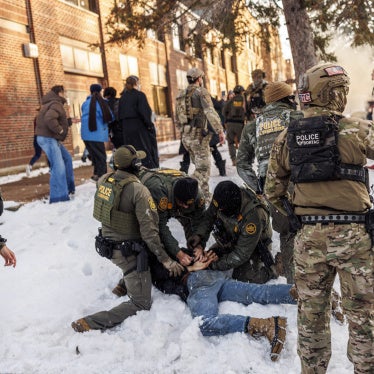If Condoleezza Rice's testimony this week at her Senate confirmation hearing as secretary of state is an indicator of the Bush administration's plans for Africa, Africans and the human rights community should be worried.
In his first four years, President Bush surprised Africa watchers by reaching out to the continent's leaders, giving priority to several African issues that included development assistance and HIV/AIDS, becoming engaged in negotiations to end the civil war in southern Sudan and declaring attacks on civilians in Sudan's Darfur province to be genocide.
But many observers credit these efforts to Secretary of State Colin L. Powell, and there are fears that with his departure, the Bush administration's interest in Africa will wane.
Given the administration's worry that parts of the continent could offer a haven to Islamic terrorists and its growing interest in African oil production, Mr. Bush's new foreign policy team will not ignore Africa outright.
The more serious risk is that under the leadership of Ms. Rice, a tough-minded pragmatist with little Africa experience, the State Department will give short shrift to concerns about democracy and human rights on the continent.
In her opening statement this week, she lumped Africa together with Latin America as places where the United States will work with "reformers ... committed to increasing opportunity for their people" and "insist that leaders who are elected democratically have an obligation to govern democratically." And she included Zimbabwe on a list of "outposts of tyranny."
But, except for very limited questions on the crisis in Sudan's Darfur region, where the administration's earlier strong human rights stand may soon be tested, Ms. Rice was not asked how she plans to deal with immediate challenges in Zimbabwe and several other countries where human rights are also threatened.
In Zimbabwe, parliamentary elections scheduled for March are likely to unfold in a climate of repression and intimidation. For the human rights situation there to improve, skilled and subtle U.S. diplomacy will be required to encourage leaders of the Southern Africa Development Community to push President Robert G. Mugabe to repeal laws restricting freedoms of association and the press and ensure free and fair elections.
In Ethiopia, the government, a strong Bush anti-terror ally, has taken tentative steps to make the May elections more free than those held in 2000. But marginal improvements in the electoral process will not make up for the government having branded most of the country's leading opposition groups, including some of its former political allies, as "terrorist" organizations and driven them underground. The Bush administration will need to find ways to ensure that the Ethiopian government is as committed to promoting political freedom as it is to helping wage a war on terror.
In Liberia, progress in restoring stability and promoting respect for the rule of law will hinge largely on elections scheduled for October. If the Bush administration is to fulfill America's "special responsibility" for this country, founded by returned American slaves, it will have to make a major commitment to bringing to justice former President Charles Taylor, who brutalized the Liberian citizenry and fomented a war in neighboring Sierra Leone. It will also have to provide substantial support to efforts to reintegrate about 100,000 recently demobilized ex-combatants.
In Rwanda, where the government of President Paul Kagame is fast eliminating space for political opposition and independent civil society groups, the Bush administration must identify ways to prevent genocide guilt from becoming an excuse for turning a blind eye to the government's new practices of repression.
In Uganda, President Yoweri Museveni, who is seeking ways to repeal constitutional limits that would force him to leave office in 2006, has intimidated and tortured his political opponents. He is also fighting a war against rebels in the north, where more than 1.3 million war-affected civilians have been displaced. The Bush administration must ensure that Mr. Museveni does not interpret continuing U.S. support, including military assistance, as a blank check to violate civil and political rights and avoid his responsibility to protect civilians in the north.
Added to this list are the equally serious human rights challenges the new Bush team could face in the likely event of renewed fighting in the Democratic Republic of the Congo, where 3.3 million civilians have died since 1998.
In the coming months, events in Africa will almost certainly force Ms. Rice to confront the questions about U.S. policy toward human rights in Africa that she wasn't asked at her confirmation hearing. When that happens, one can only hope that the Bush administration will once again surprise us, as it did with its strong stand against what it has called genocide in Darfur.
Michael Clough is Human Rights Watch's interim advocacy director for Africa. Nicholas Galletti is a Human Rights Watch Washington associate for Africa.






